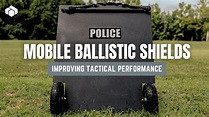Protecting those that Protect Us
In 2019, legislation was signed to permanently reauthorize the program that provides funding for police to purchase bulletproof vests. Created by the Bulletproof Vest Partnership Grant Act of 1998, the Patrick Leahy Bulletproof Vest Partnership Program (administered by the Bureau of Justice Assistance), reimbursed states, units of local government, and federally recognized Indian tribes for up to 50 percent of the cost of body armor vests purchased for law enforcement officers.
As well as the BVP, The FBI's Legacy Body Armor Program donated body armor to smaller, underfunded states and local law enforcement agencies. They supplied gear to 25 agencies across three states.
The legislation was seen as a commitment to ensure officers have life-saving equipment. Unfortunately, the Patrick Leahy program expired in mid-2024. It appears that the DOJ is limiting grants for 2025 and none of the grants include body armor.
The legislation expires with the introduction of more protective, lighter body armor technology, and specialized vests for improved visibility.
A new aramid fiber is being incorporated into body armor by manufacturers to create vests that are lighter and more flexible, while also offering enhanced protection against a higher number of rounds. Armor made using this new technology is designed to be more durable than current standards, aiming to keep officers less vulnerable during high-threat situations. In addition, the vests are lighter, provide greater comfort and reduce fatigue. The improvements increase the likelihood that officers will wear them more consistently.
As well as new fiber being used, A new Lit Safety Vest, was designed by an officer who introduced it in May of 2025. The rechargeable LED light was designed with the idea to make first responders highly visible in low-light conditions.
In November 2023, the National Institute of Justice released the new performance standard. It is the first update since 2008 and is designed to address new weapon threats faced by law enforcement.
As of early 2025, accredited laboratories began testing and certifying armor under the new standard. The new Compliant Products List is expected in 2026, though some companies have already submitted products for pre-certification testing. The new standards feature more rigorous testing, tighter rules for shot location, and a standardized threat definition for the 7.62x39mm rifle cartridge.
In May 2024, a bipartisan bill was advanced in Congress to mandate better-fitting body armor for female law enforcement officers within the Department of Homeland Security. This follows reports and FBI testing that found flaws in existing vests for women.
Some armor products have been found to degrade when exposed to light, heat, and humidity, which was the basis for a lawsuit against the Ocala Police Department for being sold ineffective body armor. A class-action lawsuit was filed, and a settlement was reached that included providing effective vests to affected departments.
There is also a debate over the aesthetics of police uniforms versus officer safety. Some members of the public may find heavy body armor and tactical gear to be intimidating, leading to protests or other negative impressions.
On the flip side there are no nationwide restrictions on the purchase or ownership of body armor for most civilians. The only federal prohibition applies to individuals who have been convicted of a violent felony.
Violent felony conviction: Federal law (18 U.S.C. § 931) makes it illegal for anyone with a conviction for a violent felony to purchase, own, or possess body armor.
Employment exception: A convicted felon can possess body armor if their employer requires it for a lawful job and provides written permission.
Online sales: Federal law does not restrict online sales or shipments of body armor, but individual state laws can override this.
Increased penalties: Wearing body armor while committing a violent federal crime or drug-trafficking offense can result in longer prison sentences.
Besides Federal restrictions civilians must also follow state restrictions. Most other states allow law-abiding citizens to purchase body armor online or in person without permits. Purchasing body armor from various retailers is legal in most states, but the buyer is responsible for knowing local laws.
New York: Following a 2022 law, most civilians in New York are prohibited from purchasing or possessing body armor. Only individuals in an "eligible profession," such as law enforcement, active military, or security guards, are exempt. All sales must be in-person.
Connecticut: Civilian ownership is legal, but online purchases and shipments are prohibited. All transactions must be conducted face-to-face. A resident must also possess a handgun or ammunition certificate to buy body armor from a local dealer.
Texas and Florida still ban convicted felons and have increased penalties for crimes committed while wearing body armor.
California- those prohibited from owning firearms are also restricted from possessing body armor and committing a crime while wearing it may result in increased sentencing.
Maryland requires a permit for individuals with prior violent crime or drug trafficking convictions.
Louisiana prohibits wearing body armor on school grounds.
Topeka, Kansas-it is illegal to wear or possess a bulletproof vest during protests or demonstrations.
Most of the complex, interconnected issues we face ultimately come down to public policy. By engaging in the policy landscape, we can reshape the systems that impact us. While the U.S. Congress may only be passing 2% of bills, state legislatures and local governments make impactful decisions on critical issues. You don’t need to be working in government to have an impact on public policy. 1. Identify Problem 2. Investigate policymaker’s Past Actions and the History of the Issue 3. Develop a policy solution 4. Implement and advocate. Engaging with policymakers, everyday citizens can become powerful agents of transformation, reshaping their communities, nation, and even the world.

